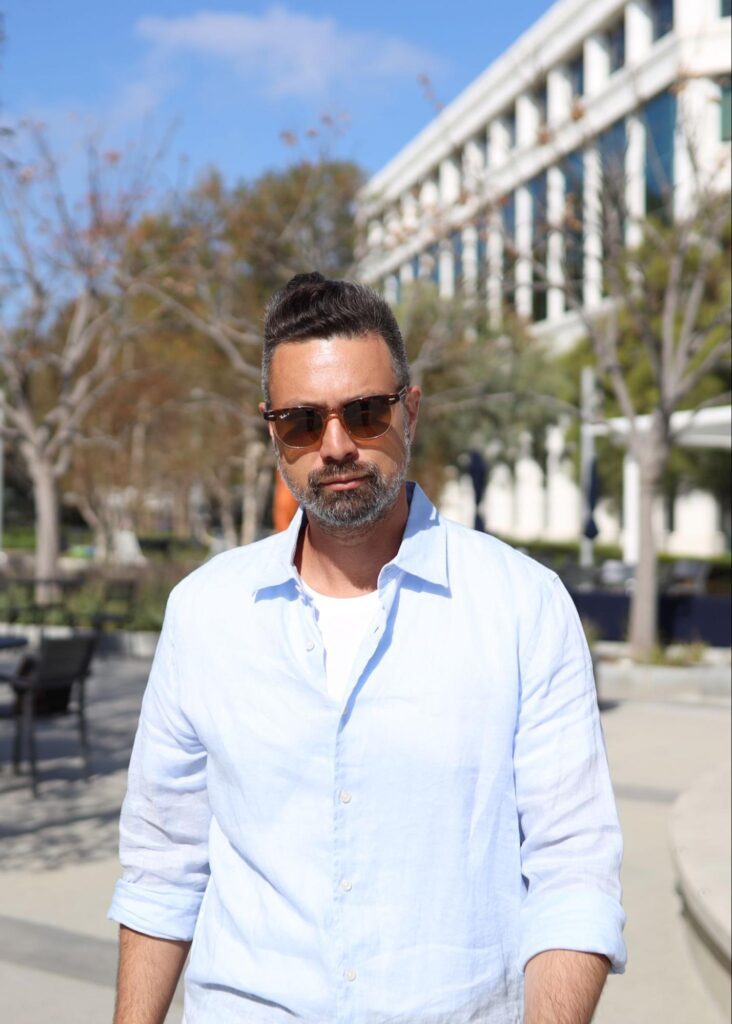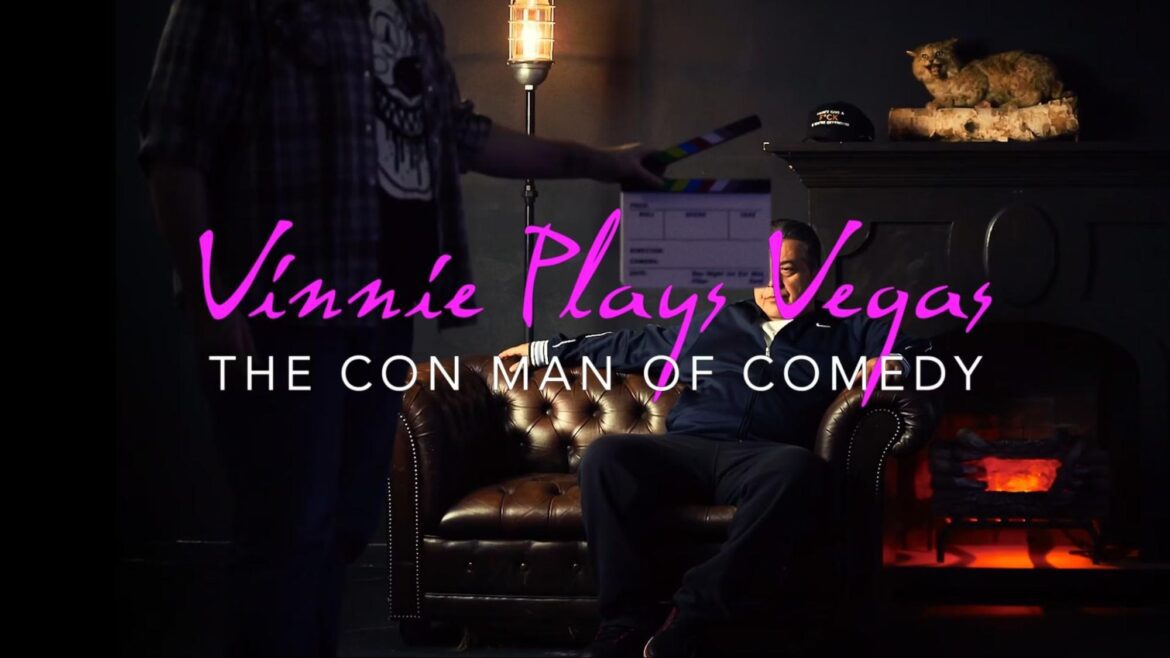In the neon-lit underworld of Las Vegas, where fortunes are made and lost on a roll of the dice, two filmmakers emerged from the shadows to tell a story as audacious as their own lives. Brian Burkhardt and Christopher Robin Gallego, the masterminds behind the incendiary documentary Vinnie Plays Vegas, are not your typical Hollywood storytellers. They’re antiheroes in their own right—men who’ve danced with demons and lived to tell the tale.
Brian Burkhardt: The Convict’s Comic

Burkhardt’s journey reads like a noir novel. Born into the gritty streets of New Orleans, he found himself entangled with crime families and eventually did hard time. It was behind bars that he discovered his knack for stand-up comedy, performing in a prison talent show that would ignite his passion for the stage. His father dubbed him the “Convict’s Comic,” a moniker he embraced as he pursued comedy upon release.
Las Vegas became his proving ground, where he worked as a craps dealer and battled his own gambling addiction. It was here he crossed paths with Vinnie Favorito, the city’s reigning insult comic. Their shared penchant for pushing boundaries forged a bond, with Favorito even allowing Burkhardt to open for him—a moment of pride when Burkhardt’s parents came to see him perform.
Now 55, Burkhardt bears the scars of a life lived on the edge: divorced, a father, and a relentless hustler with the tenacity of a Glengarry Glen Ross salesman. His narration in Vinnie Plays Vegas isn’t just commentary—it’s confession, a raw and unfiltered glimpse into a world where charm and deceit walk hand in hand.
Christopher Robin Gallego: From Strip Clubs to the Silver Screen

With a name like Christopher Robin, one might expect innocence and whimsy. And when you meet Gallego, that’s the first impression—charming, boyish, quick with a smile. But behind that disarming exterior is a man who’s wrestled with darkness and emerged transformed. Before he ever touched a camera, Gallego spent years as a nightclub and strip club DJ, living amidst the decadence of sex, drugs, and disillusionment. It was a world where masks were currency and vulnerability was a liability. That life wore him down, but it also hardened him into someone who could survive in any room and tell any story.
Determined to find meaning beyond the fog, Gallego left that life behind and enrolled at Arizona State University, where he earned a BA in Film and Media Production and won two art entrepreneurship grants. After moving to Los Angeles, he carved out a space for himself in post-production, working on high-profile projects for networks like TNT, NBC, Showtime, and Starz. But it wasn’t the glamorous side of Hollywood—Gallego was grinding, learning every inch of the system from the inside.
During the film’s post-production, Gallego also found himself navigating the emotional fallout of a breakup with comedian and content creator Jaclyn Passaro. The end of the relationship became a turning point—not just personally, but creatively. In the quiet aftermath, Gallego was forced to confront aspects of himself he had no idea needed confronting: ego, control, and accusations of narcissism. Rather than retreat, he allowed the experience to refine him. It stripped away the last vestiges of the wide-eyed idealist he had once been and forged a more grounded, clear-eyed storyteller. The heartbreak, painful as it was, sharpened his instincts and deepened his understanding of the characters he was documenting. It was no longer just Vinnie’s fall from grace on the screen—it was Gallego’s own confrontation with impermanence, identity, and the cost of chasing something bigger than yourself.
Still, nothing would test him more than the battle to save Vinnie Plays Vegas. After being let go from the Las Vegas-based streaming startup MagicFlix, the company refused to return the film’s hard drives. Legal threats failed. Negotiations stalled. But Gallego wasn’t ready to let the project die. Instead, he turned to FBI hostage negotiation techniques—studying Chris Voss’s Never Split the Difference like his life depended on it. Applying “strategic empathy” in real-time, he spent weeks rebuilding rapport with the company’s CEO. In a masterstroke of human psychology, Gallego flipped the script, turning an adversary into an ally and recovering the stolen footage. That wasn’t just a win for the film—it was a victory forged from every scar he’d earned along the way.
Embracing the Shadow: A Jungian Perspective
Vinnie Plays Vegas isn’t just a documentary—it’s a descent into the collective shadow, a Jungian exploration of the parts of ourselves we’d rather not acknowledge. Favorito, with his biting humor and unchecked vices, serves as a mirror to society’s suppressed desires and hypocrisies.
In an era where political correctness often stifles raw expression, the film—and its creators—stand as defiant outliers. They channel the archetype of the trickster, challenging norms and exposing uncomfortable truths. Their own histories of vice and redemption lend authenticity to the narrative, allowing them to tell Favorito’s story with unflinching honesty.
A Cultural Shift: The Right Moment for This Film
It is perhaps only from the spirit of the bad boy that a story like this finds the animus to be told. In a new era of Hollywood where identity politics often dictate creative output, Vinnie Plays Vegas comes along and gleefully gives the establishment the middle finger.
The insult comic, like the court jester of old, speaks truth to power under the guise of humor. His grandiose narcissism becomes a tool of catharsis, confronting the audience with the shadow they’d rather ignore. For decades, that style of comedy thrived, until it was exiled during the hypersensitive climate of the 2010s.
But the pendulum is swinging back. Roasts are resurging. Comedians are fighting back against cancel culture. And in the vacuum left by sanitized entertainment, audiences are craving the raw, the real, and the unapologetically human. In this moment, Vinnie Plays Vegas doesn’t just feel timely—it feels inevitable.
When Scatena & Rosner Films picked it up for distribution, it wasn’t just because it was well-made. It was because it had teeth.
Have you ever met a con man that wasn’t charming?
That line from the film could just as easily apply to the filmmakers themselves. Burkhardt and Gallego aren’t afraid to get their hands dirty. They aren’t selling virtue. They’re selling truth—gritty, seductive, uncomfortable truth. And in doing so, they may have just redefined what it means to be the bad guy in Hollywood.
Maybe the best people to tell a story like this were the ones who lived it, lost it, and crawled back with the camera still rolling.
Disclaimer
The experiences and reflections shared in this article represent the personal perceptions and emotional journey of the filmmakers.
Any references to individuals, events, or circumstances are provided solely for illustrative purposes, intended to highlight the filmmakers’ process of personal growth and self-reflection.
No statement contained herein should be construed as a factual assertion, accusation, or definitive commentary regarding the character, conduct, or intentions of any third party.
This narrative is offered in good faith and is not intended to defame, disparage, or cause harm to any individual or entity.
Readers are encouraged to interpret the content as a personal perspective, not as an objective report or factual claim.
For more information on Vinnie Plays Vegas and updates on the documentary’s release, please visit Vinnie Plays Vegas.
Follow Christopher Robin Gallego on Instagram at @mrchristopherg and X at @mrchristopherg.
For press inquiries, please contact: Degen Films
Phone: 424-209-9931
Email: ch***@**********io.com

